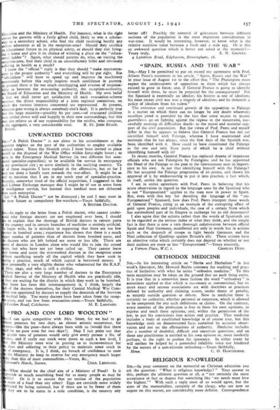" SPAIN, RUSSIA AND THE WAR "
Snt,—May I be permitted to put on record my agreement with Prof. Allison Peers's statement in his article, " Spain, Russia and the War " in your issue of August 1st to the effect that " The Phalangists must expect the undercurrent of opposition to them which has always existed to grow in force; and, if General Franco is going to identify himself with them, he must be prepared for the consequences? For the Spaniard is essentially an idealist; his history is one of idealism; his most recent civil war was a tragedy of idealism; and he demands a policy of idealism from his rulers."
The existence and continued growth of the opposition to Falange is a matter on which there can no longer be any doubt whatever; excellent proof is provided by the fact that some 20,000 to 30,000 guerrilleros go on fighting against the regime in the mountains, suc- cessfully meeting all difficulties thanks to the moral and material sup- port of the civil population. But the views of Prof. Peers and myself differ in that he appears to believe that General Franco has not yet identified himself with Falange, whereas I have maintained and maintain that he has always, since the first days of the Spanish war, been identified with it. How could he have constituted the Falange as the one and only State party of which he is chief without identifying himself with it?
In recent months, General Franco has replaced dozens of important officials who are not Falangists by Falangists; and he has appointed the Head of the Falange to the post in the Government next in import- ance to his own. Is not that identifying himself with the Falange? He has accepted the Falange programme of 26 points, and shown his approval of it by endeavouring to put it into practice, a fact which, in itself, settles the question.
I am in entire agreement with Prof. Peers in believing that his acute observation in regard to the language used by the Spaniard who is not "Europeanised " applies to the men now in power in Spain. But, even with this key for decoding the language of the " un- Europeanised " Spaniard, how does Prof. Peers interpret those words of General Franco, citing as an example of the corrupting effect of gold upon peoples and individuals, the case of a certain State which has surrendered part of its Empire in exchange for 5o old destroyers?
I also agree that the actions rather than the words of Spaniards are to be regarded as the serious index of what they think, and the simple fact is that there is now a very thorough collaboration between official Spain and Nazi Germany, manifested not only in words but in actions such as the despatch of troops to fight beside Germans and the Nazi collection of Quislings against Britain's ally. These actions have an objective value which certainly does not depend on whether or not their authors are more or less " Europeanised."—Yours sincerely,


























 Previous page
Previous page